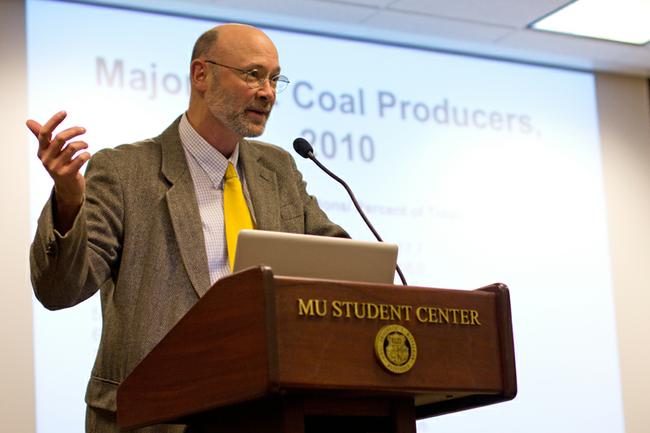Coal Free Mizzou partnered with Renew Missouri to host a spring semester kickoff event featuring two speakers, professors Bill Allen and Karen Piper, Wednesday in the MU Student Center.
Agricultural journalism professor Bill Allen started the event on an inspiring note, drawing parallels between Coal Free Mizzou’s goal of eliminating coal from MU’s campus and his own generation’s protests against the Vietnam War.
“These efforts take lifetimes,” he said. “And it’s not just one generation that can put things right.”
Allen said because the largest coal producers in the United States, Peabody Energy Corporation and Arch Coal Inc., have their headquarters in St. Louis, students at MU are uniquely positioned to make a positive difference in coal policies.
Allen also said he had frustrations about the fact corporations, lobbyists and the media perpetrate the denial of climate change by instilling doubt about the veracity of scientists’ findings.
“Somehow today, the public still believes there is mass confusion about the issues of global warming and climate change,” he said. “How can an issue settled in the scientific world still be hotly debated in the world of public policy?”
The second speaker was MU English professor Karen Piper. Piper grew up in an area of the country with exceptionally high levels of particulate matter in the air, which resulted in chronic bronchitis as a child. Her grandfather, a coal worker, died when her father was young from work-related illness, she said.
During her speech, Piper focused on the many preventable health issues coal production generates, including increased levels of mercury and contaminated drinking and ground water near coal factories. Although she acknowledged small efforts toward reducing energy use are important, Piper said the most important step toward stopping climate change is policy reform.
“We need to fight for alternative energy to be funded and more widely available,” she said.
A third guest was Lindsey Berger, a 2009 graduate of Missouri State University who started and spread coal-free student organizations throughout the state.
Berger congratulated Coal Free Mizzou on being the first organization of its kind in Missouri. Since its founding in 2009, seven of Missouri’s 10 largest schools have begun partner organizations. According to Berger, MU has become a national model for other schools trying to reduce dependence on coal as a source of energy.
Coal Free Mizzou Vice President Taylor Dankmyer said he looks forward to a productive semester and plans to focus on creating increased awareness on campus and working with campus administrators to reduce MU’s reliance on coal.
“We want to continue to grow as a group and get a meeting with Chancellor (Brady) Deaton to discuss, in person, the need to get MU off of coal as soon as possible,” Dankmyer said. “We’ve had meetings with the Vice Chancellor and various other administrators, but we’d like to get a meeting with Mr. Deaton.”
Dankmyer also said a major step toward reducing MU’s coal use is shutting down the university-operated coal-fired power station, located less than a quarter of a mile west of Jesse Hall. Students who live near the plant experience increased incidents of asthma-related health issues.
“This semester we will focusing heavily on engaging local health professionals, as well as students and community members feeling the health effects of local coal power,” Dankmyer said.
Sophomore Leah Bartmess said she left with a sense of purpose.
“It’s so important to inform people of the facts,” she said. “Without that knowledge, people aren’t inspired to act, and it just results in a diffusion of responsibility.”








